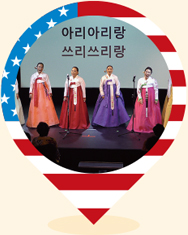Global Korea I
Exploring Ancient
Korea-Japan Ties
in Asuka
Osaka

Forty Japanese participants took part in a field walk titled “Following in the Footsteps of Korea-Japan Ancient History of Exchange in Asuka” organized by the KCC in Osaka, Japan. Situated in Nara Prefecture, Asuka was the capital of ancient Japan, and the discovery of remains and relics of Korean clans there indicate brisk exchanges between ancient kingdoms on the Korean Peninsula and Japan.
First, the group visited the ruins of Hinokumadera Temple at the Hinokumadera site, the home of Yamato No Aya Uji, a clan whose origin has been confirmed as the Korean Peninsula. The second site was the ruins of Kawaradera Temple, a structure that paid homage to Japanese Empress Saimei, who sent rescue forces to the Baekje Kingdom.
The trekkers then visited the Asuka Historical Museum, where the region’s cultural assets are preserved and exhibited. They listened to guides explaining the characteristics and background of important exhibits related to Korea and touched the roof tiles manufactured in Buyeo about 1,400 years ago. Despite the scorching heat, the participants were attentive to the explanations and asked many questions.
The KCC has held field walks centered on Korea-Japan relations in Wakayama, Osaka, Kyoto and Nara over the past four years. Such events highlight features of the Kansai region, which has conducted brisk cultural and human exchanges with the peninsula since ancient times.
Fusion Gugak:
‘Tradition and Now’
LA

The KCC staged “Tradition and Now,” a fusion gukak (traditional music) performance, in collaboration with the Ji Yun Ja Gayageum Korean Traditional Intangible Cultural Center as the sixth event of the 2019 ARI Project, with around 150 people and cultural artists attending.
The performance was presented by ethnic Korean artists active in the U.S. and Korea. Part 1 featured the gayageum (zither) ensemble Salpuri that accompanied the byeongchang (solo singing and playing) and a choir of folk songs introducing traditional Korean culture through performances of traditional music and dance. Ji began Part 2 with her “Gayageum Sanjo” in the style of Seong Geum-yeon, followed by “Ensemble Sinawi” using improvisation similar to jazz musicians, attracting thunderous applause from the audience.
Throughout the performance, a variety of fusion gukak acts were presented including “La Ventana,” a mixture of flamenco guitar and gayageum, by the Rami Seo World Music Ensemble, “White Moon,” a collaboration by a 25-string gayageum player, keyboardist Ji Hyeon-su and the Rami Seo ensemble was next, followed by “Run on Grassland,” a piece that made the public feel like they were standing on green grass. “On the Hills of Andalusia” created an exotic mood and transported the audience to Spain with the virtuosity and the marvelous harmony. The performance showed how traditional Korean music continues to develop and communicate with the world through collaboration and evolution.
Global Korea II · Written by Korea Institute of Startup & Entrepreneurship Development
K-Startup Week:
ComeUp 2019

K-Startup Week: ComeUp 2019, set to run from Nov. 27-29 at Dongdaemun Design Plaza (DDP) in Seoul, is expected to attract players in the global startup ecosystem including domestic and overseas startups, investors, entrepreneurs and media.
Venture firms and startups in major economies are rapidly emerging as key sources of economic growth. Startup events abroad such as Tech Crunch in the U.S. and Slush in Finland publicize their host country’s startups at home and abroad and support scaling up through networking with overseas venture capitalists.
In line with this global trend, Korea must host large-scale networking events to start an innovative startup boom and connect with the global startup ecosystem by providing Korean startups with the opportunity to enter overseas markets. Thus, ComeUp 2019, which stresses challenge and innovation, will enable cooperation between the private sector and the government to build Korea into a leading startup nation.
This event is hosted by the Ministry of SMEs and Startups and organized by the Korea Institute of Startup and Entrepreneurship Development and the ComeUp 2019 Organizing Committee. The three objectives of ComeUp 2019 are to build a privately led global startup ecosystem, host a global startup festival and seek innovative growth startups for win-win cooperation.
The main event will comprise the eight sessions of Food Tech, Fintech, Mobility, Entertainment, Beauty & Fashion, Bio & Health, Edu Tech & Lifestyle, and Frontier Tech, all of which reflect global trends. In-depth lectures and panel discussions will cover emerging issues of the startup ecosystem with prominent speakers from home and abroad.
In addition, investor relations pitching seeks to discover outstanding entrepreneurs with global competitiveness and promote them to domestic and overseas startups to strengthen their links to startup figures.
ComeUp 2019 is a catalyst for networking among stakeholders by bringing together global startups, investors, entrepreneurs, the media and the public. Additionally, the Korean government and related organizations will work together with the private sector to make this event the world’s best for global startups based on the participation and creativity of those involved in domestic and overseas startups. Amid rising interest and active engagement, the event’s organizers hope ComeUp 2019 eventually emerges as Korea’s leading startup event .



































